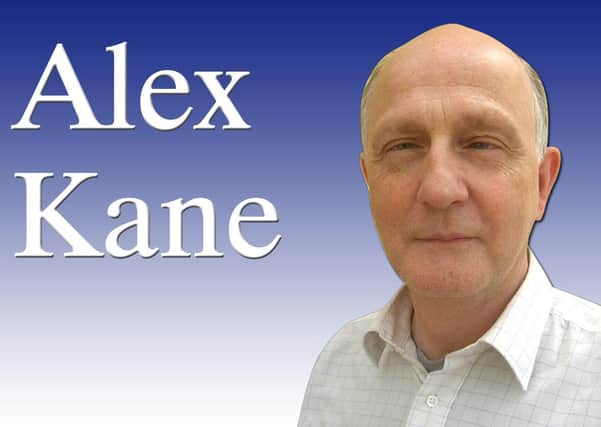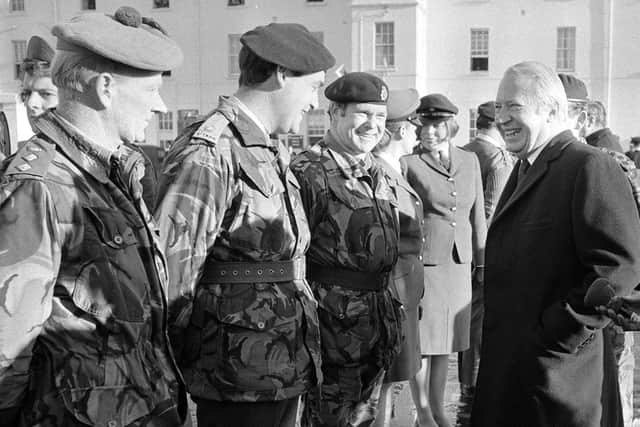Alex Kane: Indifference on NI’s place in the Union has been Westminster norm since Edward Heath


At that time all UUP MPs took the Conservative whip in Parliament and a number of them held positions within the party structures. But none of them were briefed about what Heath was planning to say: “Many Catholics in Northern Ireland would like to see Northern Ireland unified with the South. That is understandable. It is legitimate that they should seek to further that aim by democratic and constitutional means. If at some future date the majority of the people in Northern Ireland want unification and express that desire in the appropriate constitutional manner, I do not believe any British government would stand in the way. But that is not what the majority want today.”
Crucially, Heath didn’t take the opportunity to make a pitch for the constitutional integrity of the United Kingdom, nor make any suggestions about what could and should be done to make Catholics/nationalists feel more at home in the UK and therefore less likely to support a united Ireland. Anyway, within three months of that speech he had prorogued Stormont and seven months after that endorsed a policy for future mandatory power-sharing and the recognition of an ‘Irish dimension’.
Advertisement
Hide AdAdvertisement
Hide AdI never got the opportunity to interview Brian Faulkner (he died in 1977, while I was still at university) so never got the chance to press him on whether he had been prepared to take huge personal and political risks for the Sunningdale Agreement in 1973/74 because he believed that Heath was not a friend of ‘Ulster’ unionism and would become even less friendly if his plans for a deal were thwarted.


As it happens, I was reasonably supportive of the Sunningdale Agreement. Fine, there were a number of difficulties with it but I believed (I was 18 at the time) that a few years of genuine power-sharing – particularly against the background of a still very comfortable pro-Union majority – might create the circumstances in which we could surprise ourselves by working together. But, the ‘moment’ had been and gone by May 1974. I stupidly, very stupidly it turns out, believed that 1998 presented another serious opportunity to surprise ourselves. We didn’t. We haven’t. We won’t.
In a speech in London in November 1974 Faulkner made a point which still has relevance today: “It is in the tragedy of Ulster that we have seen most dramatically the dangers of government – and I am not blaming one party more than the other – which has not confidently and unswervingly pursued policies founded on principled commitment. In their anxiety ‘not to take sides’ leaders of both main parties in Britain have appeared to be anxious, as one observer has put it, ‘to do neither wrong nor right’. The results have been the spread of doubt, indecision, an air of open-endedness about the future – the very environment in which the ruthless, fanatical terrorists thrive and increase in strength.”
For years, from the early 1970s right the way through to the present day, leader after leader within mainstream, small stream, liberal and civic unionism, along with their counterparts across loyalism, has complained about the failure of successive UK governments to take their side. I can’t remember the exact words, but I do remember former UUP leader Jim Molyneaux telling me something along the lines, “it’s hard to give unionists reasons for confidence when the prime ministers who talk about the value of the United Kingdom seem to do most to undermine our place within it”.
Advertisement
Hide AdAdvertisement
Hide AdAt the time the UUP and Conservatives were working on their UCUNF project (2007-10) when David Cameron was leader of the opposition, a number of very senior DUP MPs and MLAs told me how stupid the party was to put its trust in ‘any Conservative leader’. When they cut their own deal in July 2017 I reminded one of them about their previous criticism: “Don’t worry Alex, we aren’t the UUP. We won’t be played for mugs. The Tories know better than to try and take us for a ride.” And yet that’s exactly what Boris Johnson did and continues to do to them.
In 2002 I was invited to a private meeting which involved people who had previously served with the RUC, UDR and RIR; some having held very high rank. Some had supported the Good Friday Agreement, some hadn’t. They wanted to talk (and I’m presuming they had similar engagements with others) because they were concerned that the government was too concerned with keeping Sinn Fein and the IRA on board rather than giving attention to the specific concerns of unionism. “The same old story,” was how one of them described it. What stuck most in my mind, though, was a comment from an ex-RUC officer: “Our job was to protect the entire community from terrorism, but we were always keenly aware that the government was probably in secret talks with them, trying to buy them off.”
So much of what I have heard and seen down the years brings me back to Faulkner’s point from 46 years ago: ‘... the spread of doubt, indecision (and) an air of open-endedness about the future.’ When I was a member of the Conservative Party in NI in the early 1990s I remember telling a couple of NIO ministers that the most important thing they could do was demonstrate a willingness to be seen to stand shoulder to shoulder with the pro-Union community, as well as making the pro-Union case for those from a non-unionist background. I was greeted with blank looks. They seemed genuinely shocked that I should think they should be seen to champion the Union.
If you don’t take a side all you do is convey the impression that you aren’t all that fussed about the end goal. What that does is unsettle those who believe you are on their side, as well as encouraging those with a different view, who believe you might be biddable. That was the message from a UK prime minister in 1971. I don’t think it has changed since then.
——— ———
A message from the Editor:
Advertisement
Hide AdAdvertisement
Hide AdThank you for reading this story on our website. While I have your attention, I also have an important request to make of you.
With the coronavirus lockdown having a major impact on many of our advertisers - and consequently the revenue we receive - we are more reliant than ever on you taking out a digital subscription.
Subscribe to newsletter.co.uk and enjoy unlimited access to the best Northern Ireland and UK news and information online and on our app. With a digital subscription, you can read more than 5 articles, see fewer ads, enjoy faster load times, and get access to exclusive newsletters and content. Visit https://www.newsletter.co.uk/subscriptions now to sign up.
Our journalism costs money and we rely on advertising, print and digital revenues to help to support them. By supporting us, we are able to support you in providing trusted, fact-checked content for this website.
Alistair Bushe
Editor